An Interim Report: Te Kāhui a Kiwa—Advancing Indigenous self-determination and wellbeing through trade and can the CPTPP help, a conference held 28-29 June 2023, Gallagher Academy of Performing Arts, Hamilton, New Zealand
“Ka pū te ruha, ka hao te rangatahi—the old net withers, the new net goes fishing”
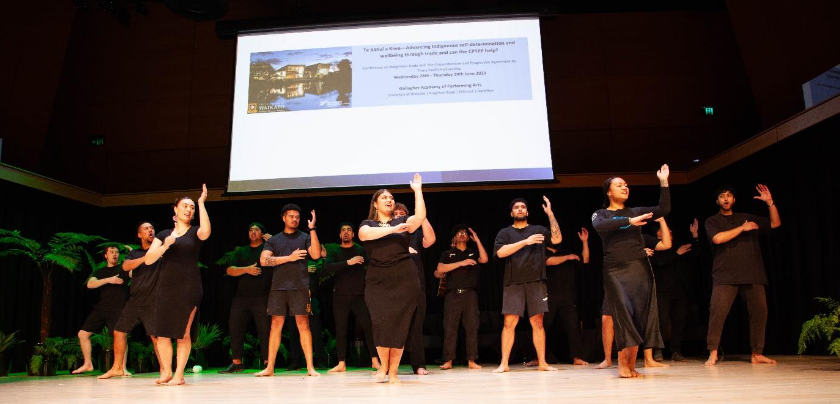
Prepared for
Hon Damien O’Connor
Minister for Trade and Export Growth
Chair of the Ministerial CPTPP Commission Meeting
Prepared by
Jason Paul Mika and Moana Maniapoto
Date
13 July 2023
Contacts
Te Kotahi Research Institute
Dr Jason Paul Mika
Associate Professor
m: 021 970 421
e: jason.mika@waikato.ac.nz
Ngā Toki Whakarururanga
Moana Maniapoto
Co-Convenor
m: 0274 714991
e: moananz@icloud.com
Introduction
Te Kāhui a Kiwa
- This report provides an interim account of a conference held in Hamilton on 28-29 June 2023 called Te Kāhui a Kiwa—Advancing Indigenous self-determination and wellbeing through trade and can the CPTPP help. The conference was hosted by the University of Waikato, working collaboratively with Ngā Toki Whakarururanga, with funding from the Ministry of Foreign Affairs and Trade (Manatū Aorere). University kaumātua (elder) Koro Taki Turner gifted the conference its name. Kāhui refers to an assembly of stars or in this case, people, while Kiwa is short for Te Moana nui a Kiwa—the great ocean of Kiwa, the Pacific Ocean. Speaker biographies and the programme can be viewed on the conference website here. Note the online programme is not the final version, as some speakers were unable to attend due to illness or travel disruption.
Aims
- The conference had three main aims: (1) to hear Māori and Indigenous views about trade under free trade agreements like the Comprehensive and Progressive Trans-Pacific Partnership (CPTPP); (2) to examine the adequacy of protections for Māori and Indigenous rights, responsibilities, duties and interests in the CPTPP; and (3) to discuss how the CPTPP needs to change to better support Māori and Indigenous aspirations to be self-determining, protect te Tiriti o Waitangi rights and responsibilities, and improve the wellbeing of Māori and other Indigenous Peoples. These aims were touched on by Stella McLean, Waikato University Student Union vice-president and Te Ranga Ngakū co-president in her openining remarks.
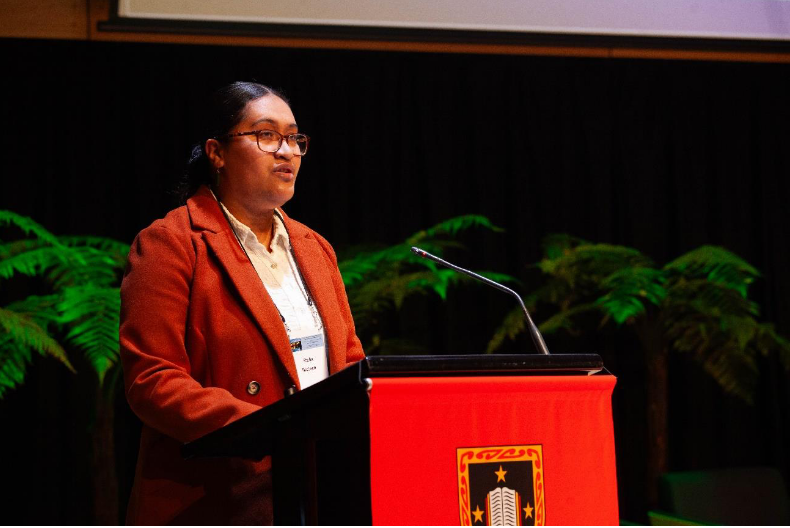
Outcomes
- Overall, the conference was broadly successful in achieving its aims. We had around 150 people attend the first day and 120 attend the second. Attendees included Māori in small scale and
arger businesses ranging from technology, media and traditional healing to food production, forestry and fisheries, as well as iwi members, lawyers, academics and students, government officials and policy makers. All but three of the 35 speakers and facilitators identify as Indigenous, mainly Māori, but also Pacific and Aboriginal. The success of the conference can be attributed to three factors:|
(1) the decision for Waikato University and Ngā Toki Whakarururanga to combine their events;
(2) Manatū Aorere funding, which made it easier for speakers to attend;
(3) relationships between the organisers and Māori and Indigenous Peoples involved in the Indigenous enterprise and the broad trade policy space. What could have been better is state support for attendance of Indigenous Peoples from other CPTPP Parties.
Indigenous Rights And Aspirations
- Waikato University worked closely with Ngā Toki Whakarururanga to deliver a programme that combined a focus on how trade policy and agreements should and can protect Māori and Indigenous rights and responsibilities and to advance Indigenous aspirations for beneficial engagement in trade activity. Waikato University has an increasing interest in Indigenous trade research while Ngā Toki Whakarururanga is a leading national Māori organisation focussed on the promotion and protection of Māori and Indigenous rights and responsibilities under te Tiriti o Waitangi in trade policy and agreements. While the conference was linked to the CPTPP, it elevated Māori and Indigenous voices, particularly wāhine (women), rangatahi (youth), and pūkenga (experts), on trade policy generally as well the CPTPP. Indeed, rangatahi speakers on climate change, digital innovation, and technical provisions of the CPTPP were among the most inspiring, including, for example, Stella McLean, Carrie Stoddart-Smith, India Logan-Riley, and Peter Lucas-Jones.
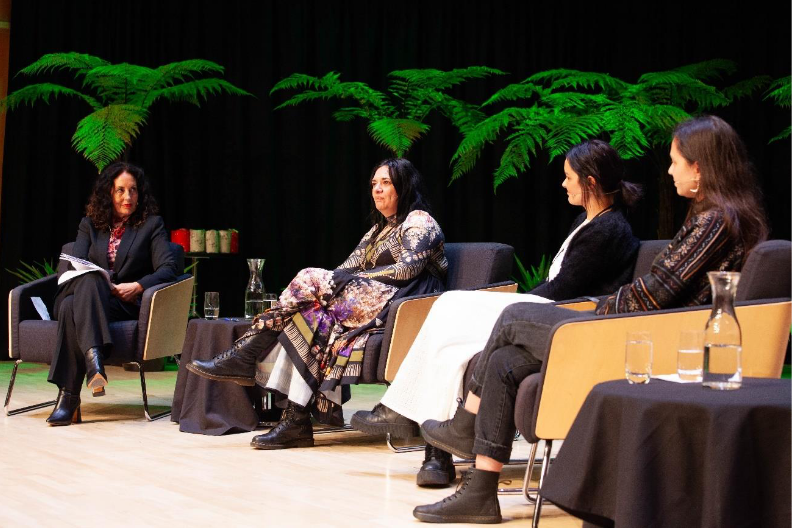
Conference Speakers And Themes
Keynotes
- Two keynotes opened each day. On day one, Annette Sykes, a leading Māori lawyer, outlined the whakapapa (history) of Māori opposition to free trade agreements that impact negatively on Māori and other Indigenous Peoples, including the Waitangi Tribunal inquiry on the TPPA/CPTPP (Wai-2522). While there have been some hard-won successes, she concludes that negotiations and agreements remain far from te Tiriti-compliant. On day two, chief trade negotiator, Vangelis Vitalis, spoke about how the CPTPP is helping diversify and expand New Zealand’s international trade.
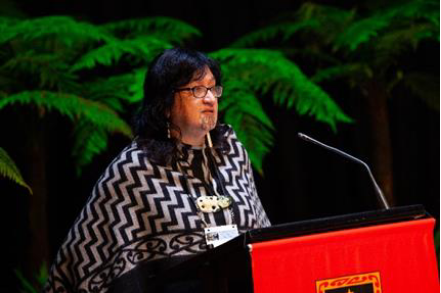
Annette Sykes
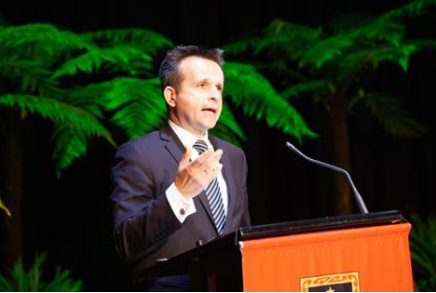
Vangelis Vitalis
Panels
- Ngā Toki Whakarururanga co-convenor Moana Maniapoto moderated three panels on a te Tiriti o Waitangi-based approach to trade agreements, reflections on the CPTPP and the Wai 2522 inquiry, and the CPTPP review and ITAG work. MC Pahia Turia facilitated a panel on Indigenous perspectives on the CPTPP review, with two te Tiriti partner organisations represented—Ngā Toki Whakarururanga (Maui Solomon) and Te Taumata (Chris Insley), as well as Te Hurumanu chair, Ngahiwi Tomoana, who advises Manatū Aorere. We heard a recorded key message of support from Hon Nanaia Mahuta, Minister of Foreign Affairs and an in-person presentation from Hon Rino Tirikatene, Minister of State for Trade and Export Growth.
- On day two, we had three panels, which included two international speakers, Risa Schwartz, a Canadian lawyer and Indigenous trade policy expert, and Professor Dennis Foley, an Aboriginal entrepreneurship scholar. The programme concluded with four parallel workshops on investment, agribusiness, digital trade, and climate change, and a final workshop on the CPTPP, followed by a plenary reflecting on conference outcomes.

Diverse Indigenous perspectives
- The conference was notable for its inclusion of diverse Indigenous perspectives. On the one hand, we had speakers who have deep concerns about the inability of current trade policy and agreements to protect Indigenous rights and responsibilities because they prioritise commercial interests over people and Papatūānuku. Others were cautiously but optimistically engaged in trade because of its ability to contribute to Indigenous livelihoods and wellbeing. The importance and difficulty of protecting Indigenous rights and kaitiaki (custodian) responsibilities in international and domestic policy was acknowledged in both perspectives. Speakers also emphasised how trade must and can contribute to Indigenous wellbeing. In this context, Indigenous Peoples’ self-determination in the title of the conference requires respect for and recognition of Indigenous aspirations to engage in trade on their terms and in accordance with our values and world views, to have our rights and responsibilities protected as we see fit, to participate as equals in decisions that affect us, and to achieve wellbeing for ourselves and others through this activity. Rights protection and enablement are not trade-offs; both are enhanced through Indigenous self-determination.
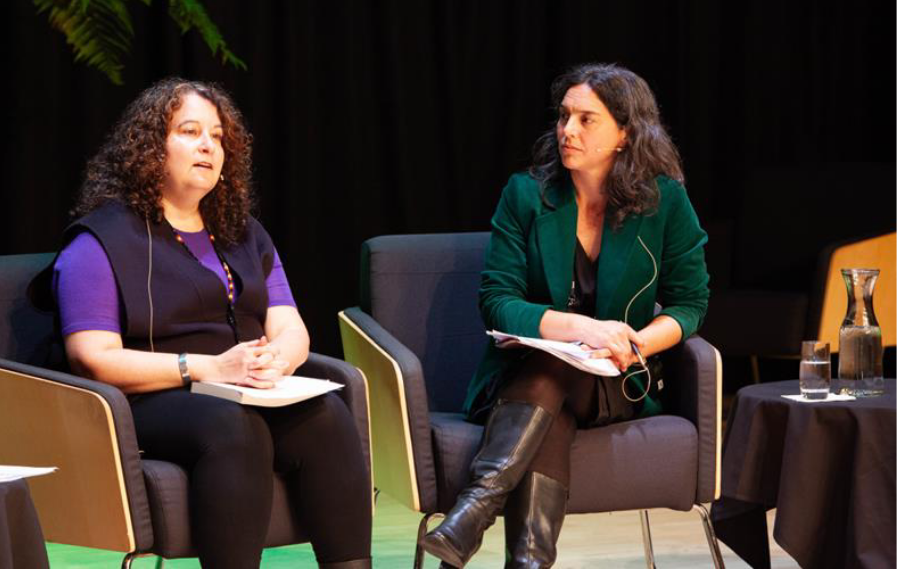
Role Of The Cptpp
Protecting rangatiratanga
- The question we set out to discuss is can the CPTPP help achieve Indigenous aspirations for self-determination and wellbeing through trade? The answer was that, by and large, it does not. The primary reason identified by many speakers was the failure of the CPTPP and similar agreements to protect the rangatiratanga (self-determination) and mana (power and authority) of Māori to determine our own future under te Tiriti o Waitangi and the United Nations Declaration on the Rights of Indigenous Peoples (UNDRIP). Māori do not need more trade policies and strategies that talk about us without us. Māori and other Indigenous Peoples need to be empowered to provide leadership in the trade space.
Alternative trade model is needed
- That leadership should reflect the reality that Indigenous Peoples have been traders for time immemorial, based on Māori values of manaakitanga (generosity) and whanaungatanga (relationships), underpinned by responsibilities of kaitiakitanga (stewardship), and conducted according to tikanga Māori (Māori cultural practices). The CPTPP was not seen to recognise or provide any space for that. Rather, speakers described it as a neoliberal model that enables the commodification and exploitation of that which Māori have a specific duty and responsibility to protect. So, the problem is not just specific parts of the CPTPP, it is the model itself. An alternative trade model that works for Māori needs to strengthen Indigenous-to-Indigenous trade through traditional as well as contemporary forms in addition to enhancing larger scale commercial trade. That should include traditional forms of creativity, such as tā moko (traditional tattoo), food production and seeds, traditional healing, such as rongoā, culturally safe forms of digital technologies, care for te taiao (the environment), and the prevention and responses to climate, pandemic and other emergencies. Speakers called on CPTPP parties to empower and resource Māori to lead on these matters and conduct their own trade delegations, not to pose barriers to doing so and provide token recognition of Māori within a neoliberal model.
Negative impacts of the CPTPP
- Several panels also addressed the negative impacts of CPTPP-style free trade agreements on their specific kaupapa, in areas like food sovereignty and genetically modified organisms (GMO)s; the environment and climate crises; the threats of investor-state dispute settlement (ISDS); barriers to social procurement designed to benefit Māori communities, workers and businesses; Māori control over data, open source software and digital media; and constraints on domestic legislation and policy on organics, plants, seeds, and rongoā (traditional healing). We heard that the Treaty of Waitangi exception written into the CPTPP does not provide effective protection against these many negative impacts and that broader and more effective carveouts promoted by Aotearoa New Zealand in recent agreements, including at the WTO, need to form part of the CPTPP review, and should apply to all Indigenous Peoples.
Indigenous world views offer solutions
- The threat posed by the climate crisis was another central theme. The rangatahi especially maintain that Indigenous world views need to be seen as providing the solutions, rather than being treated as exceptions or add-ons. When the impacts of international trade agreements like the CPTPP on Indigenous Peoples’ lands, resources and livelihoods, and on thousands of years of cultures and knowledges are ignored, and our rights, responsibilities, duties and interests are not protected, the parties are not only condemning the future of Indigenous Peoples and our descendants, but the planet as whole. Next generations of Indigenous Peoples, as caretakers of the planet, are being left to live with the crisis being created by the failure of today’s generation to act. Solutions in trade agreements that are based on new technologies serve no purpose when the planet, all its ecosystems and all life that relies on those systems are dying.
A seat at the table
- The closing panel made it clear that nothing can change to address these concerns and give effect to te Tiriti o Waitangi unless Māori have an independent seat at the table. That is what the relationship in te Tiriti envisaged and that is what Māori expect to happen – not just for Māori, but for all Indigenous Peoples whose duties, responsibilities, rights and interests are affected by the CPTPP. Maui Solomon also presented number of recommendations from Ngā Toki Whakarururanga input to the ITAG review.
A Way Forward
Options for advancing Indigenous aspirations
- After reflecting on the discussions, six steps are suggested to address Indigenous Peoples’ rights and responsibilities, and Indigenous trade, in the CPTPP: (1) the need for a Tiriti-based approach to trade policy; (2) a relational approach to trade facilitation, including Indigenous-to-Indigenous trade; (3) a framework for Indigenous trade policy and negotiations that reflects and advances Indigenous self-determination; (4) capacity building in Māori trade and trade policy and negotiations; and (5) an annual Indigenous trade conference. Each of these ideas is briefly described.
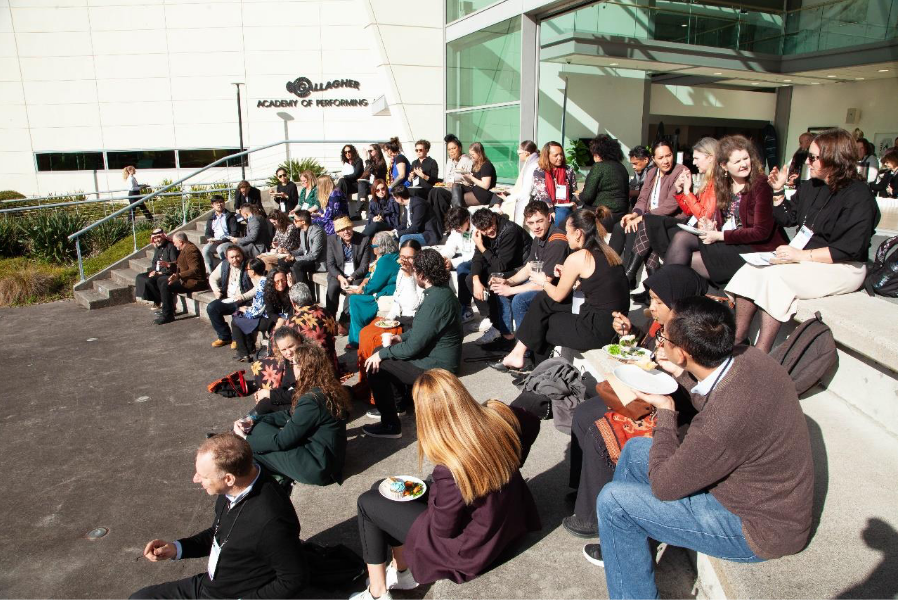
Lunchtime outside the Gallagher Academy of the Performing Arts
Tiriti-based approach to trade policy
- In Aotearoa New Zealand, te Tiriti o Waitangi sets out the constitutional relationship between Māori and the Crown of rangatiratanga and kāwanatanga and the Crown’s obligation to recognise and protect Māori authority, rights, duties and responsibilities. Relating this to the broad trade arena, Māori have a long history of treaty-making and trading that pre-dates colonial trade and is sourced in Māori values. Te Tiriti o Waitangi guaranteed Māori would continue to exercise control in those spheres. A Tiriti-based approach in the trade arena is, therefore, one in which Māori and the Crown work together as equals, Māori have an independent seat at the negotiating table alongside the Crown, and Māori are properly resourced to do this. The Ngā Toki Whakarururanga mediation agreement and its Tiriti audit framework contain principles that might underpin such an approach. A Tiriti-based approach to trade policy and negotiations is a domestic priority for Aotearoa New Zealand. It is currently a work in progress and, despite goodwill from both Tiriti parties, we are far from achieving this.
A relational approach to trade
- A relational approach to trade recognises culture as a foundation for resurgent Indigenous economies, inter-Indigenous trade, and is an integral feature of trade development. This approach reflects Indigenous Peoples’ common belief in the relationships between people and the earth. At the heart of the relational approach are concepts of whakapapa (genealogy) and whanaungatanga (relationships) which allow Māori to trace their ancestral origins beyond the tribal milieu to the 7,000-year Austronesian heritage of the Pacific. At the World Expo in Dubai, Te Aratini, an exhibition of Indigenous culture and innovation, showed how a relational approach to trade can generate culturally appropriate and sustainable forms of trade. Indigenous-led trade missions that Te Taumata is working toward are another example of this. The CPTPP economies need to consider how they can support a relational approach to trade. Ngā Toki Whakarururanga, Te Taumata, the National Iwi Chairs Forum, Federation of Māori Authorities, Poutama Trust, and New Zealand Māori Tourism are Māori organisations that are especially engaged in this form of trading.
A partnership council for the CPTPP
- At Te Kāhui a Kiwa, there were calls for a partnership-based framework for Indigenous Peoples’ representation within the CPTPP alongside the state parties. This would provide for Indigenous Peoples to be involved in the governance of the CPTPP, its implementation, and its outcomes. The Partnership Council of the Indigenous Peoples Economic Cooperation and Trade Arrangement (IPECTA) was mentioned as an example. The Partnership Council comprises representatives of Indigenous Peoples and member economies of IPETCA, currently Australia, Canada, Chinese-Taipei, and Aotearoa New Zealand. Ngā Toki Whakarururanga co-convenor Pita Tipene and Federation of Māori Authorities chairperson Traci Houpapa are co-chairs of Te Rangitūkupu, which along with Manatū Aorere led Aotearoa New Zealand’s participation in the IPECTA process. Pūkenga (legal expert) Maui Solomon has also been advising on the Partnership Council’s formation. Such an Indigenous partnership requires genuine power sharing and adequate resourcing.
Capacity building for Indigenous trade policy
- Capacity building is a means to increase Indigenous knowledge as it pertains to trade policy and the ability for Māori to exercise rangatiratanga in the development, negotiation and implementation of trade policy and agreements. Its scope may also extend to Indigenous trade and investment, as well as professional development for trade officials. Capacity building is essential for succession planning and to support the increasing demand for Māori and Indigenous Peoples for roles in Indigenous enterprise, trade, and development. Models for such an initiative exist elsewhere, including nation-building courses offered by the University of Arizona’s Native Nations Institute, the Dilin Duwa Centre for Indigenous Business Leadership at the University of Melbourne, and the Tulo Centre for Indigenous Economics in Canada. However, there are few if any centres which have Indigenous trade as their primary focus.
An annual conference on Indigenous trade
- Te Kāhui a Kiwa highlighted interest in and support for an annual conference to maintain the continuity of relationships, knowledge sharing, and action relating to Indigenous trade and trade agreements that transpired at the University of Waikato. The chair of the CPTPP could assume responsibility for organising such a conference. Te Kāhui a Kiwa worked because it was independently organised with state funding and reflected a breadth of perspectives and participants. A similar arrangement is recommended for future conferences. Indigenous participation from CPTPP parties could, however, have been better. Embedding an Indigenous conference on trade and trade agreements into the CPTPP programme would encourage all parties to support Indigenous participation.
Recommendations
- We recommend that you:
- Establish a partnership-based framework for Indigenous Peoples’ representation within the CPTPP alongside the state parties that provides for Indigenous Peoples to be involved in the governance of the CPTPP, its implementation, and its outcomes, including an independent seat at the table.
- Endorse and resource an alternative trade model designed by and for Māori to strengthen Indigenous-to-Indigenous trade through traditional and contemporary forms, in addition to enhancing larger scale commercial trade, and enable and resource Māori to conduct their own trade delegations
- Prioritise the urgency of the climate crisis in the CPTPP review by elevating Indigenous Peoples’ world views and enabling and resourcing Indigenous leadership to develop effective strategies for climate change mitigation within the broad trade space.
- Adopt broad carveouts that provide effective protection against the negative impacts of the CPTPP on Māori and other Indigenous Peoples on the lines of those advanced by Aotearoa New Zealand in recent agreements, including on e-commerce at the WTO.
- Support and resource Indigenous-designed modes of capacity building to increase Indigenous knowledge pertaining to trade policy and the ability to exercise self- determination in the development, negotiation and implementation of trade policy and agreements.
- Assume responsibility, through the chair of the CPTPP each year, to organise an annual conference to maintain the continuity of relationships, knowledge sharing, and action relating to Indigenous trade and trade agreements established at Te Kāhui a Kiwa this year.
Conclusion
We commend this report to the CPTPP meeting of ministers and invite your consideration of the same. Te Kāhui a Kiwa managed to assemble diverse Indigenous perspectives on Indigenous trade and the CPTPP in a short timeframe. Te Kotahi Research Institute and Te Raupapa Waikato Management School welcomed the chance to work with Ngā Toki Whakarururanga to host this event. We acknowledge and thank Manatū Aorere for their support and funding. We acknowledge and thank ForumPoint2 for their event management and the organising committee chair Natalie Kusabs and her team for thinking about all the things that need to be thought about in events such as this.
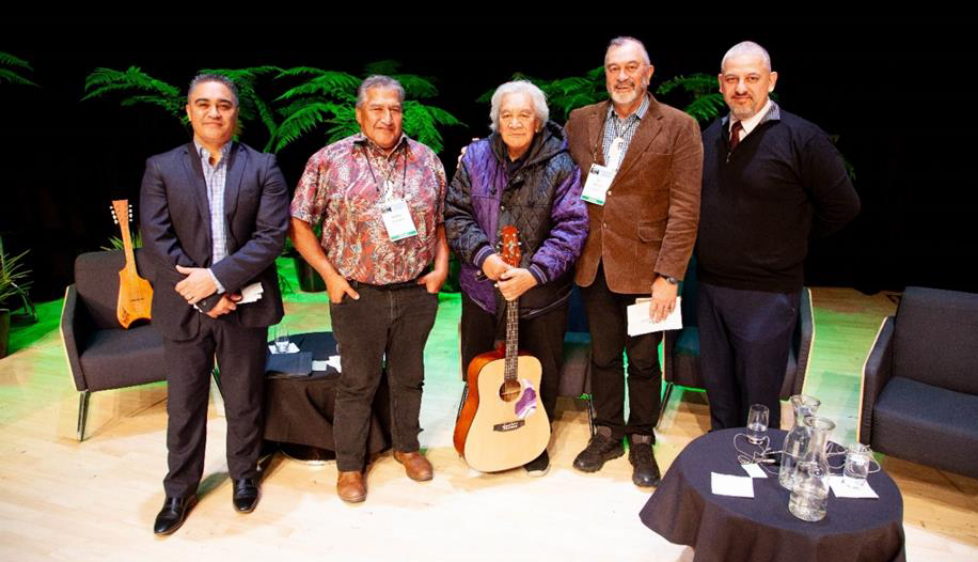
Pahia Turia, Ngahiwi Tomoana, Taki Turner, Maui Solomon, Dr Jason Mika

